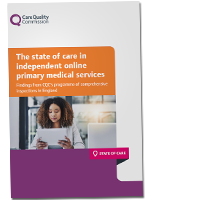This publication presents findings from our programme of inspections of primary health care services provided online in the independent sector, such as those that provide GP consultations and prescriptions through websites and apps.

The healthcare landscape is constantly evolving presenting new and innovative ways to deliver healthcare.
In the future, the delivery of healthcare online has the potential to play a major part in how healthcare is provided. We encourage innovation but it must never come at the expense of quality.
As with all healthcare services, patient safety must be at the heart of all decisions around what kind of care is offered and how it is delivered.
As providers continue to evolve, we will work alongside the people who use online services, those who provide them and our regulatory partners to encourage improvement, stay abreast of technological developments, and refine our regulatory approach.
What we did
Since November 2016, we have inspected every company in England that provides online primary care services for people in this country.
We assessed each company that provides these services against five key areas – whether they are safe, caring, effective, responsive to people’s needs and well-led.
We did this by inspecting the provider’s registered location, reviewing its systems and policies, and examining how it delivers its care. We also analysed the information that we hold about each provider. This could include feedback from people who have used or have come into contact with its services.
Our inspectors asked questions about how the service makes sure they know the identity of the patient and how the patient’s NHS GP is kept informed of any treatment.
What we found
Although there are contextual differences to consider between services delivered remotely and in person, the fundamentals of good clinical practice apply. At the end of our inspection programme, we found:
- 97% of the providers were meeting the regulations around being ‘caring’
- 90% of the providers were meeting the regulations around being ‘responsive’ to people’s needs
Safety is where we found the greatest concerns but also where we have seen the greatest improvement.
In February 2018 we found that 43% of the providers were not providing ‘safe’ care according to the relevant regulations. This was an improvement from the first inspections when we found that 86% were not fully meeting these regulations.
Our specific concerns included:
- inappropriate prescribing of antibiotics and prescribing high volumes of opioid-based medicines without talking to the patient’s registered GP
- unsatisfactory approaches to safeguarding children and those who may not have the mental capacity to understand or consent to a consultation
- not collecting patient information or sharing information with a patient’s NHS GP
- inappropriate prescribing of medicines for long-term conditions
Some providers were able to address issues on the day of inspection by, for example, deciding not to prescribe certain medicines or by introducing new policies.
We will continue to hold these providers to account and will share the good practice we find in order to encourage further improvement.
Services we inspected
Between November 2016 and August 2017 we inspected registered online primary care providers operating at that time. These services were:
- Ada Digital Health
- Antrobus Medical Limited
- Anytime Medical Limited
- Babylon Healthcare Services Limited
- Doctor Care Anywhere
- Doctor Matt Ltd
- Dr Morton’s – The Medical Helpline
- DrThom / LloydsPharmacy Online Doctor (Expert Health Limited)
- e-med Private Medical Services (see inspection report)
- Escripts Marketing (see inspection report)
- Express Dispense
- FMC Marketing Limited (see inspection report)
- Freedomhealth Ltd
- Health Bridge Ltd London
- HR Healthcare Limited
- iGP
- Index Medical Limited
- iPrimary Care
- MD Direct Ltd
- MSF Medical Services Limited
- Nationwide Pharmacies Ltd
- Now GP (Dr Now)
- Online Clinic (UK) Limited
- Oxford Online Pharmacy
- Pharmacy2U Ltd
- PostMyMeds (see inspection report)
- PrivateDoc Ltd
- Push Doctor (see inspection report)
- SH:24
- The Boots Company plc
- The GP Service (UK) Ltd
- The Independent Pharmacy
- VideoDoc Ltd
- White Pharmacy Ltd
- Yakub Chemist Limited
Download
The state of care in independent online primary health services
Join the conversation
Follow #StateofOnlineDoctors on Twitter
Press releases
Signs of improvement but some concerns remain regarding providers of online GP services
Care Quality Commission advises people to take care when using online primary care services
See also
Choosing an online healthcare service
How we monitor, inspect and regulate online primary care
Snippet for State of xxx document pages
Findings from our inspection programmes
The state of care in: